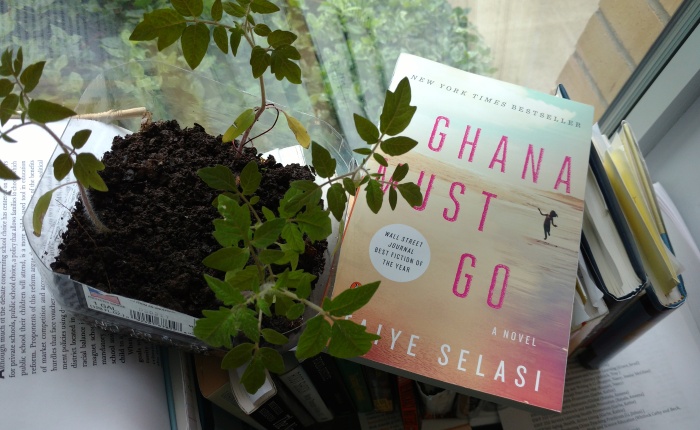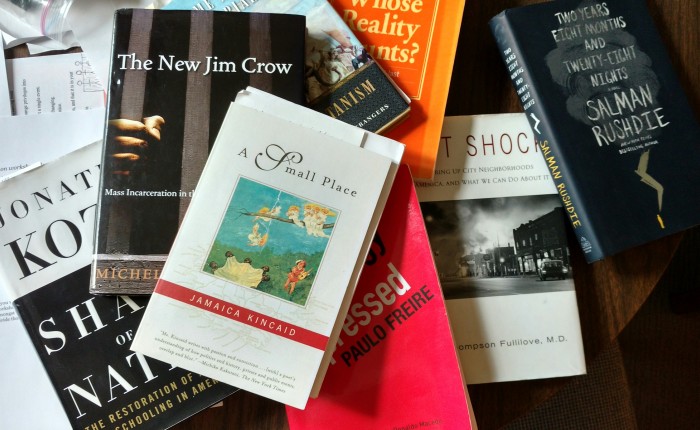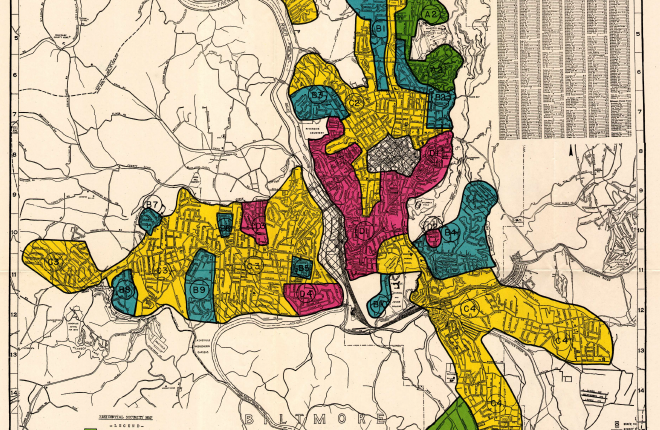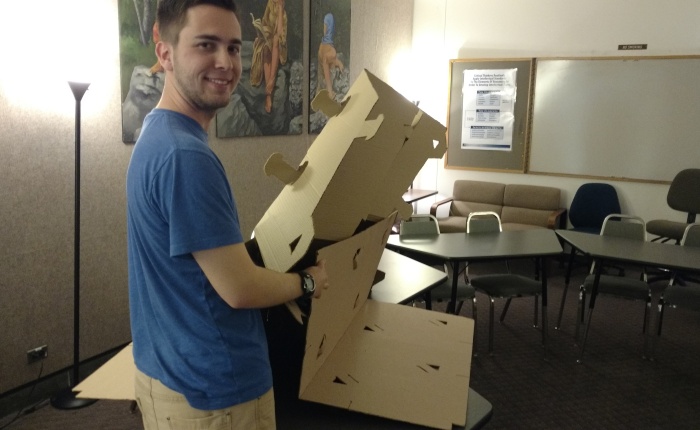Do something.
You might not always feel called to anything in particular, so your way might not always be clear.
If nothing else, do what you can.
Yesterday I arrived at work to find a copy of Ghana must go resting on my desk, a gift from the Postcolonial Literature Fairy. No time to read more than the back cover (glowing reviews from Oprah, Sapphire, and Teju Cole) before my first meeting, the first ninety minutes or so of my day’s work on the search for a new program assistant. I was heartened that all four of us on the hiring committee came to pretty speedy agreement on our top choices, and that over the next seven hours I was able to slot all of the interviews in the middle of next week.
I returned to my office after our meeting and found one of our Honors students, Preeta, about to leave me a note regarding the four tiny tomato plants she was delivering. She’d asked a week or so ago if my partner and I would like them, and we’d said yes. They’re alive. They’re potent. They’re healthy and strong.
I set the plants in the window sill and spent a few minutes reviewing Honors Program candidates. A few withdrawals had left us with a couple of open slots to offer to other hopefuls. I hope that the news we sent these folks made their days.
Offer carrots, not sticks. You may run out of carrots. Resist the urge to pick up sticks.
In the early afternoon I met up with a former student, Sallie, to talk about life plans. A sudden turn of events (one that’s caused her to rethink the post she’d already drafted for this blog, by the way) has left her thinking about what’s next for her: a career change? back to school? new town, new state? She’s drawn to teaching, but isn’t sure yet. We talked about how easy it is to let school institutionalize you, how easy it is to do something because it’s the easiest next step.
Be intentional, but beware of best intentions; we know where those can lead.
We also talked about pets. She has a new dog. My partner, Candace, and I have two crazy dogs. And two cats. And two rabbits. And a snake.
Watching a roughly-two-year-old dutifully deliver scrap of paper after scrap of paper to the wastebasket while every adult in the room watched adoringly, we talked about children. “How are you feeling about being a soon-to-be-stepfather?”
“I’m loving it,” I said. I told her about how I’ve grown into the role, taking each step carefully, eyes wide open. I told her about how my partner has helped keep my eyes open, every step of the way, knowing that step-parenting is coming to me somewhat late in life.
On the way back to campus, I took a twenty-minute detour to seek out the resting place of Isaac Dickson, a local historical figure after whom Candace’s children’s elementary school is named. Dickson had come up in conversation the other night when Candace’s son told me that my university’s library has a copy of Dickson’s “letter of recommendation,” spurring me to think of ways one might bring this man to life for a group of third graders.
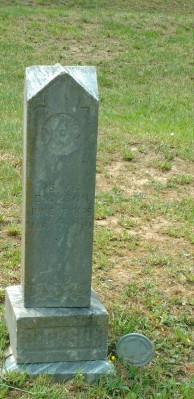 Isaac Dickson was a freed slave who played seminal role in the development of our city’s public educational system and in the foundation of the Young Men’s Institute, a local organization that’s advocated for black youth for over a hundred years now.
Isaac Dickson was a freed slave who played seminal role in the development of our city’s public educational system and in the foundation of the Young Men’s Institute, a local organization that’s advocated for black youth for over a hundred years now.
“We the undersigned citizens have bin acquanted with Isaac Dixon for years past and have ever found him to be an honest and upright man,” his rec letter reads, the above claims attested to by seven “persons of good character & standing” in Cleveland County, North Carolina.
Riverside Cemetery was peaceful, high old trees rasping the cloud-free sky. I wound down the hill, following the curve of the earth. Groundskeepers on riding lawnmowers kicked up clouds of dust. Around a sharp left bend near the bottom, I paused, knowing Dickson’s marker was near. It took only a minute or so to find it, a four-foot-high obelisk with a cross-gabled peak.
Urban renewal in the 1960s claimed Dickson’s home, near what’s now the eastern edge of downtown.
Coincidentally, Candace spent an hour or so this afternoon with her son’s class as his school took part in a demonstration downtown, Stand Against Racism. The procession to the demonstration site took them past the monument (a much taller obelisk, standing roughly seventy feet) to Zebulon B. Vance, Confederate general, politician, and slave-owner. Vance, too, is interred at Riverside Cemetery.
Resist the urge to pick up sticks.
My last task on campus was an appearance at the afternoon’s meeting of the Academic Policies Committee, one of the standing committees of our faculty senate. This body is charged with helping folks to shepherd curricular changes through the legislative process. I’d been called to testify in my role as the current transitional writing coordinator, a position created a few years back to help faculty in the changeover from the old general education writing requirements to the new ones. Writing intensive courses were scrapped, department-specified writing “competencies.” The latter term is, in practice, construed quite broadly.
When asked whether I felt my current position should be made permanent, I answered with an emphatic “yes.” I cited my concerns that assessment is currently patchy at best and nonexistent at worst, that once-jam-packed historically writing-intensive courses are not so jam-packed anymore, and that many departments, while intending to offer solid instruction in disciplinary writing, simply are not doing so.
Beware of best intentions; we know where those can lead.
As I left the meeting and walked off campus, I thought about how the tone of conversation had been civil, balanced, inviting. No mansplaining, though several men had been present. I thought of a comment I’d seen my colleague Will Banks make on one of his own Facebook posts earlier in the day: “If I could have a professional goal, it would be to stop [men from taking credit for women’s ideas in meetings], but I don’t even know how you’d start that project…maybe teaching is my best intervention on a future generation?”
Several years ago, I admitted to one of my calculus students (a wise woman a few years my senior who was coming back to school to jump-start a second career in engineering) that I felt frustrated by my seeming inability to make a macroscopic difference in society in my role as a math professor. “What can I do, really? Am I doing enough?”
“Of course you are!” she assured me. “You’re doing what you can, and you’re doing it well. Teachers have a greater impact that you think.”
Do something. If nothing else, do what you can.
